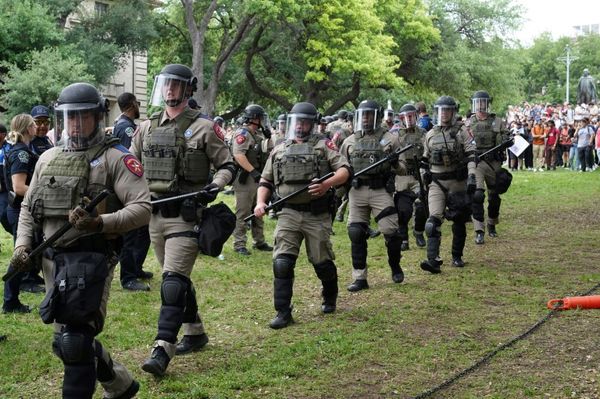
"Could you go on mute, please?"
I'm on the set of Retrograde, a new six-part dramedy from the ABC. Actually, scratch that, I'm not on the set. Like seemingly everyone else on the planet, I'm in a kind of purgatory between real life and simulation: the Zoom call.
While actors test lines and crew members in masks and gloves adjust camera set-ups, I'm hovering in the virtual background in an attempt to figure out just how a TV show about life under lockdown gets made while life is under lockdown.
And because this is a work-related video call in 2020, the rules are that at least somebody has to tell somebody else to please mute their mic.
As one actor finishes breakfast and another deals momentarily with "dog duty" — they are working from home, after all — it's time to begin shooting one of the few television shows the coronavirus pandemic has not knocked out of production.
Retrograde has come together quickly
As the lockdown began in Brisbane in March, Meg O'Connell helped organise a virtual bar with a bunch of friends. About 30 came and went over the course of the first night.
A TV producer who worked on last year's innovative mobile-first comedy Content, O'Connell knew this was the solid foundation for a story about young people navigating a strange new socially distanced world.
"I got a call from Meg after I had spent a couple of nights in the bar doing trivia or whatever," says producer Jackson Lapsley Scott, who also worked on Content.
"She's like, 'Hey, we want to make a show out of the bar, can you figure out how it works?'"
Within a week it was pitched to Que Minh Luu, at the time an executive producer at ABC TV, who had also worked on Content.
She loved the idea. From that point, it was a race to get it to screens while the experience of lockdown felt current.
"It's something between a Zoom call, which we are all familiar with, and a live sports event in the way that it is shot," says O'Connell, the show's co-creator and writer.
"It's a multi-cam studio sitcom but all the cameras are remote and director and the actors are all in different suburbs but relaying to each other as though they are on the same set."
Film and TV producers around the world are trying to figure out how to produce content — demand for which is high right now — while keeping everyone safe.
While shows like Parks and Recreation have done one-off iso-specials, and Neighbours has led the way in filming safely on set, Retrograde becomes possibly the first scripted TV series to air that has the reality of lockdown baked into its premise.
Becoming grounded during a pandemic
In the first episode, Maddie (Pallavi Sharda) is on a video chat with her close friends while packing up her room. At 32, she is preparing to move to Seoul to take up a new job.
Of course, that plan very quickly blows up. She is now not just homeless and unemployed but — like many of us — beginning to ask larger questions about her life.
Her friends are, too, among them Ramsay (Ilai Swindells), who has lost his job at a bar, and Isabel (Maria Angelico), who is going through a divorce and having some discipline issues with her toddler.
"We have 100 per cent tried to deal with some of those existential thoughts that have circled in all of our minds over this period," O'Connell says.
"I don't think we've got any answers — I don't think anyone does — but it has been nice to percolate on them."
Lockdown has been a complicated experience for Sharda herself.
After a decade filming overseas, for roles in Bollywood productions as well as 2016's Lion, she returned to her hometown of Melbourne as the pandemic began.
"The last three years, I have spent only three weeks in my bedroom in Bombay," she says.
"And that's kind of ridiculous."
The experience of staying on home soil for an extended period — not to mention going through her first Melbourne winter since she was at uni — has been both confronting and re-energising, she says.
"There are a lot of tight parallels between Maddie and myself in terms of this sudden change of plans and grappling with being quite grounded," Sharda says.
You are part of the Zoom chat
Everything you see in the first episode of Retrograde you see through the prism of the video call.
"What we have now is essentially a laptop in front of each actor, with Zoom call on it," says Scott of the production process.
"So, they see what you see … which is all of them up in a grid."
Attached to the back of each laptop is an iPhone. Everything is shot by those phones, with the director and cinematographer viewing footage remotely. The phones are switched out twice a day so the footage can be downloaded.
Each actor, who is filmed inside their own homes, had a technical operator on hand to help with sound, lighting and set dressing, Jackson says.
"We are just experts at Zoom now," Sharda says of her fellow actors.
"We had a guest actor on for one of the episodes [and] he said, 'I guess the wrap party is going to be on Zoom then'. I went, 'What did you think was going to happen, mate?'"
Are we ready for this?
The first episode of the show begins on the eve of the first nationwide lockdowns and travel bans in March.
It debuted this week on the ABC on the eve of a second wave of lockdowns in Victoria, where people are concerned and apprehensive about another six weeks with little physical contact.
Asked if audiences will be ready to confront lockdown in pop culture while still saddled with it, O'Connell says, "I think people want to see their own situation reflected back to them".
"And there's not really much on TV that is doing that."
She says that, as with her own real-life virtual bar (which continues, though she's been to busy to log on), "clearly there is joy to be found in the communities that crop up in lockdown and isolation".
"Retrograde is trying to create a little bit of that, along with some bitter-sweet humour — as well as drama."
Jackson says that the show was conceived during a time when a younger generation, accustomed to working through weirdness or sadness online, was collectively trying to come to terms with this weird and sad situation.
"We process things communally, borrowing opinions as well as methods of grief and celebration. This show is an extension of that impulse."






